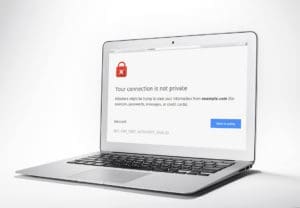 SSL stands for Secure Sockets Layer and SSL Certificates make your website a safer place by doing background checks and encrypting data entered on your website. Having an SSL Certificate means that a background check was done on your website and it ensures the business is attached to that particular domain name. Having an SSL Certificate also means when a user enters data onto your website, the data is jumbled up so hackers cannot understand the information the user just entered and then the information is unjumbled when it gets to its destination (you). In the past, it was recommended your website have an SSL Certificate only if your website had forms that accepted personal information such as credit card information, social security number, etc. and now Google has been cracking down because hackers can now cross check information entered over a number of sites and voila they have everything they need to steal your identity. A user can enter their email address on one site without an SSL Certificate, enter their address on another, and maybe their birthday on another and the user can unknowingly be susceptive to having their information hacked.
SSL stands for Secure Sockets Layer and SSL Certificates make your website a safer place by doing background checks and encrypting data entered on your website. Having an SSL Certificate means that a background check was done on your website and it ensures the business is attached to that particular domain name. Having an SSL Certificate also means when a user enters data onto your website, the data is jumbled up so hackers cannot understand the information the user just entered and then the information is unjumbled when it gets to its destination (you). In the past, it was recommended your website have an SSL Certificate only if your website had forms that accepted personal information such as credit card information, social security number, etc. and now Google has been cracking down because hackers can now cross check information entered over a number of sites and voila they have everything they need to steal your identity. A user can enter their email address on one site without an SSL Certificate, enter their address on another, and maybe their birthday on another and the user can unknowingly be susceptive to having their information hacked.
Google is now saying that all data entry should be encrypted and frankly RPS agrees. Google feels so strongly about this that Chrome users will see an error/warning when entering a site that has any type of form and does not have an SSL Certificate.
Google used to reward those who had an SSL Certificate, but now those who don’t have it are actually being penalized. It turns out that Google Chrome has about 57% of the market share. That means that Chrome is the most popular browser and it is going to give all users a warning when trying to reach your website if you have any forms on your website and do not have an SSL Certificate. Many of these users will be weary of your site and probably not visit your site at all (we definitely do not want this).
On a positive note, having an SSL Certificate is indicated to help your SEO rankings, but now it’s so much more than that. It’s more of a usability requirement rather than just a ranking advantage. Users will feel safe when seeing that you have an SSL Certificate and many people will not put their information on a site if it is not secure. To be honest, no one at RPS would enter their information on a site without an SSL Certificate and neither should you. Heck, we recommend your website have an SSL Certificate even if you don’t collect any information because it will help boost the confidence of your site’s visitors and there will be SEO ranking benefits.
There are easy ways to check and see if your website or the website you’re visiting has an SSL Certificate. The most common way is checking to see if the URL says “https://” and not “https://” and many times you’ll see a padlock icon in the URL bar. You can actually click on the padlock icon to display more information.
 One thing you should look out for is certificates do expire and need to be renewed every year. If you pay for your SSL Certificate there will be annual fees involved, but there are many free options available. When working with RPS, we will automatically make sure your certificates are renewed each year because we want to make sure your website stays AWESOME. Since we now recommend all websites have an SSL certificate, RPS is making it a policy effective October 1st, 2017 to include an SSL Certificate on all clients’ websites because we think it’s that important. We highly recommend anyone who does not have an SSL Certificate get one as soon as possible to ensure your users are not getting any errors and are able to trust your website.
One thing you should look out for is certificates do expire and need to be renewed every year. If you pay for your SSL Certificate there will be annual fees involved, but there are many free options available. When working with RPS, we will automatically make sure your certificates are renewed each year because we want to make sure your website stays AWESOME. Since we now recommend all websites have an SSL certificate, RPS is making it a policy effective October 1st, 2017 to include an SSL Certificate on all clients’ websites because we think it’s that important. We highly recommend anyone who does not have an SSL Certificate get one as soon as possible to ensure your users are not getting any errors and are able to trust your website.
Not sure how to go about setting an SSL Certificate up for your website? RPS can help! We just ask you cover a one-time one hour of labor cost of $100 and you’ll be ready to go (and so will your website’s users).
We’d love to hear your questions/concerns about SSL Certificates, feel free to reach out!

